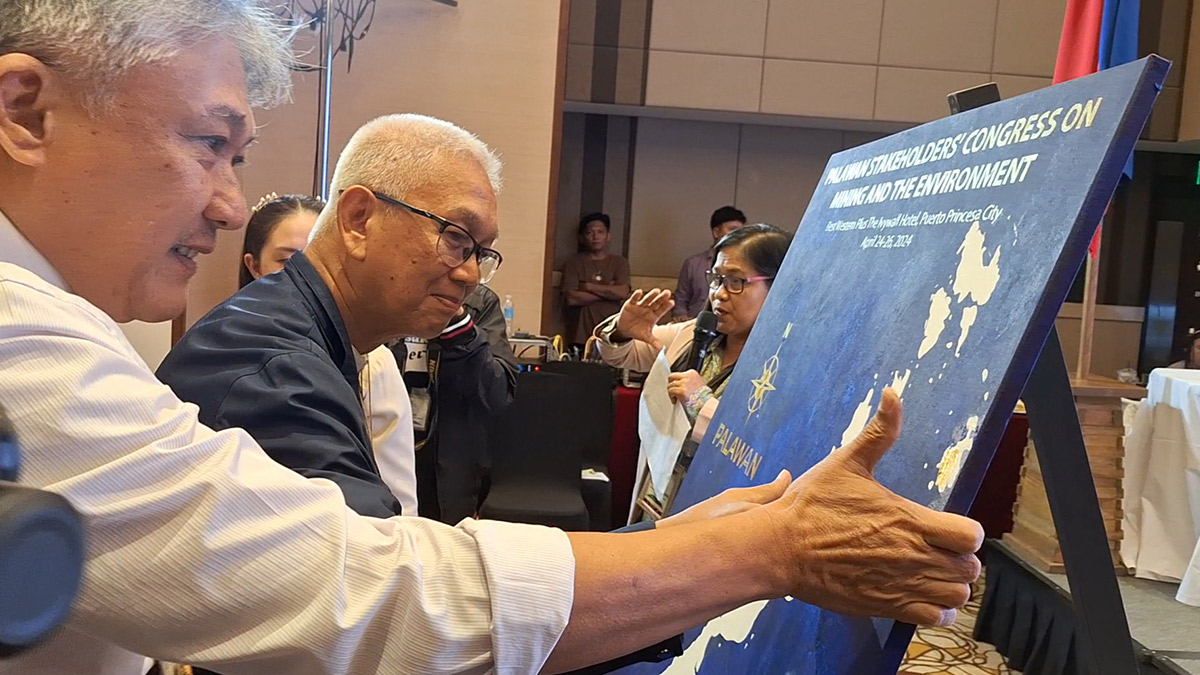
MARKS OF COMMITMENT Palawan Gov. Victorino Dennis Socrates (foreground) and Bishop Broderick Pabillo of the Apostolic Vicariate of Taytay affix their thumbmarks on the map of Palawan bearing the “declaration of commitment” forged during the Provincial Stakeholders’ Congress on Mining and the Environment on April 26. GERALDFORD TICKE
PUERTO PRINCESA CITY, PALAWAN, Philippines — Participants of the Provincial Stakeholders’ Congress on Mining and the Environment (PSCME) held in this city on Friday called for a moratorium on the issuance of new permits for new mining operations in Palawan.
The PSCME participants said the moratorium on the approval of applications for new mining exploration, new mineral production sharing agreement (MPSA), and financial or technical assistance agreement should take place here while Republic Act No. 7942, or the Philippine Mining Act of 1995, was being reviewed for its proposed amendments.
The PSCME was organized by the Palawan provincial government through its planning and development office to gather local officials, heads of concerned government agencies, business, academe and nongovernmental organizations (NGOs), and church leaders in the province to get their sentiments and concerns regarding the mining industry here.
READ: Mining firm in Palawan faces another stop order
READ: Gov’t foresees dimes from mining, but miners espy nickel
Among the participants were Bishop Broderick Pabillo of the Apostolic Vicariate of Taytay; Bishop Socrates Mesiona of the Apostolic Vicariate of Puerto Princesa; lawyer Danilo Uykieng, acting director of the Mines and Geosciences Bureau (MGB), who represented Environment Secretary Maria Antonia Yulo Loyzaga; MGB-Mimaropa Regional Director Felizardo Gacad; lawyer Grizelda Mayo-Anda, for the NGO Environmental Legal Assistance Center; Rufo Cabanlig, the country manager of London Metal Commodities Ltd.; and Jose Bayani Baylon, president of RTN Foundation Inc., a sister company of the Rio Tuba Nickel Mining Corp. (RTNMC).
Gov. Victorino Dennis Socrates said he felt the need to gather the stakeholders amid rising new challenges that the province is facing regarding mining and environmental protection.
Socrates said the results at the gathering would be considered as big factors for the provincial government’s future policies on mining because they reflected the real sentiments of the people.
In an interview after the congress on Friday, Socrates said the declaration echoed the mood of the “overwhelming majority of Palaweños as it reflects their desire as agreed upon during the congress.”
No effect on existing miners
However, the governor stressed that should the provincial government decide to officially back the moratorium, it would only apply to new and pending applicants and not the nine existing mining operators in Palawan.
At present, there are around 84 pending applications for MPSA in the province that could be “greatly affected” by a moratorium in entertaining mining applications, said Socrates.
“The nine existing [mining operations], they will remain unless they are found to have violations. But for the new applications, the regulatory agencies must be aware of the desire for a moratorium,” he said.
Palawan is home to some of the country’s leading nickel mining companies, including the RTNMC based in Bataraza town, the country’s biggest ore mining firm. Nickel Asia Corp., RTNMC’s parent company, said on its website that it exports “saprolite and limonite ore to our customers in China and Japan, who process our ore to produce ferronickel and nickel pig iron, used for the production of stainless steel.”
The other mining operators in the province are Coral Bay Nickel Corp., Ipilan Nickel Corp., Citinickel Mines and Development Corp., Celestial Mining and Exploration Corp., Macroasia Mining Corp., Central Palawan Mining and Industrial Corp., Pyramid Hill Mining and Industrial Corp., and Palawan Star Mining Ventures Inc.
Sustainable mining
The discussion at the three-day congress revolved around the national policy framework on mining, the sustainable development framework for Palawan, the stewardship of creation from a religious perspective, the impacts of mining on socioeconomic development, compliance, monitoring, and enforcement, and the issue of sustainable mining. Socrates said the last was framed as a question of whether there is indeed sustainable mining.
Aside from the moratorium, the declaration also called for an increase in penalties for violations as per terms and conditions in the environmental compliance certificate and Social Development and Management Program, an increase in royalty shares of indigenous communities, and requiring mining companies to secure business permits from host municipalities.
The group also called to expand and consider the rotation of civil society organization representation in the Multipartite Monitoring Team and additional membership from the religious sector in the Palawan Council for Sustainable Development (PCSD), among others.
Socrates said that while the declaration is not really binding, it will serve as a guiding principle for policymakers of the province for future actions regarding mining applications.
He said that policymaking bodies, such as the PCSD, should bear in mind that there is an overwhelming majority that is calling for action, particularly on the moratorium.
“For example at the Palawan Council for Sustainable Development, it processes applications for strategic environmental plan clearances of mining exploration applicants. What is stated in the declaration is that Palaweños want a moratorium that should weigh heavily on the minds of the council members. They are aware of that, so they will have to decide based on their own consciences. They are free to decide although they know the sentiments of the people,” Socrates elaborated.
He added that the same applies to the Sangguniang Panlalawigan (provincial board), where mining companies have to secure endorsements for their MPSA.